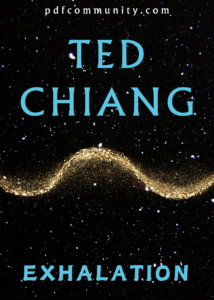Ted Chiang’s Exhalation: Stories is a collection of nine thought-provoking science fiction short stories. Each story explores complex themes such as time, memory, free will, and the nature of humanity. Chiang uses speculative settings and technologies to dive into deeply philosophical questions, offering readers a fresh perspective on life, technology, and existence.
Outline of Main Points
- Introduction to Exhalation
Overview of the book and its themes. - Summary of Each Story
- “The Merchant and the Alchemist’s Gate”
- “Exhalation”
- “What’s Expected of Us”
- “The Lifecycle of Software Objects”
- “Dacey’s Patent Automatic Nanny”
- “The Truth of Fact, the Truth of Feeling”
- “The Great Silence”
- “Omphalos”
- “Anxiety Is the Dizziness of Freedom”
- Themes Across the Stories
Examination of time, identity, and human-technology interaction. - Conclusion
Final reflections on the book’s impact.
Introduction to Exhalation
Ted Chiang is renowned for blending hard science fiction with deeply human stories. In Exhalation: Stories, he continues this trend with narratives that are as emotional as they are intellectual. The book doesn’t just explore futuristic ideas; it also questions what it means to be human in an ever-changing world.
1. The Merchant and the Alchemist’s Gate
This story combines time travel with the structure of an ancient Arabian tale. Fuwaad, a cloth merchant, visits a shopkeeper who claims to have a device that allows people to visit the past or future. Through several interwoven tales, Fuwaad learns that time travel cannot change the past but can help individuals find closure. The story emphasizes the themes of regret, forgiveness, and the inevitability of fate.
2. Exhalation
Set in a mechanical world populated by robot-like beings, this story examines the nature of consciousness and the universe. The narrator, a scientist, discovers that their world is running out of energy, akin to a wind-up clock. This leads to philosophical musings on entropy, mortality, and the interconnectedness of all life. The story is a meditation on the fragility of existence and the pursuit of knowledge.
3. What’s Expected of Us
This short piece is a cautionary tale about free will. A simple device, called a Predictor, flashes a light one second before its button is pressed. The device proves that free will is an illusion, causing existential despair among its users. Chiang uses this premise to explore how the loss of belief in free will might affect humanity.
4. The Lifecycle of Software Objects
In this novella, Chiang explores the development of artificial intelligence. Ana and Derek work on creating “digients,” digital pets with personalities. Over years of interaction, the digients grow and form bonds with their human caregivers. The story raises ethical questions about responsibility, attachment, and what constitutes a meaningful relationship.
5. Dacey’s Patent Automatic Nanny
This story critiques humanity’s reliance on technology in parenting. A man creates an automated nanny, but the machine’s lack of emotional understanding causes unintended consequences. The tale serves as a reflection on the balance between technological assistance and genuine human connection in raising children.
6. The Truth of Fact, the Truth of Feeling
Chiang juxtaposes two narratives: a futuristic society where a new memory-enhancing technology changes how people perceive their past, and a historical account of a tribal society adopting written language. Both stories examine how technology reshapes our understanding of truth and memory, highlighting the tension between objective facts and subjective experiences.
7. The Great Silence
This story takes the form of a monologue delivered by a parrot, reflecting on humanity’s search for extraterrestrial intelligence. The parrot laments how humans overlook the intelligent species already present on Earth. The story is a poignant commentary on communication, extinction, and the anthropocentric bias in human exploration.
8. Omphalos
In a world where religious beliefs about the universe’s creation are scientifically validated, a devout archaeologist uncovers evidence that contradicts her faith. The story delves into themes of purpose, faith, and the human desire for significance in a vast, indifferent cosmos.
9. Anxiety Is the Dizziness of Freedom
This story explores the multiverse through “prisms,” devices that allow users to interact with alternate realities. The characters grapple with moral dilemmas and the burden of choice as they observe how small decisions create vastly different outcomes. The story investigates the psychological impact of free will and parallel realities.
Themes Across the Stories
Time and Free Will
Chiang repeatedly examines the relationship between time and choice. In stories like “The Merchant and the Alchemist’s Gate” and “What’s Expected of Us,” he challenges the notion of free will and explores the consequences of knowing the future.
Technology and Humanity
Several stories, including “The Lifecycle of Software Objects” and “The Truth of Fact, the Truth of Feeling,” investigate how technology shapes our relationships and understanding of the world. Chiang highlights both the potential and dangers of relying too heavily on artificial systems.
Memory and Identity
In “Exhalation” and “The Truth of Fact, the Truth of Feeling,” Chiang explores how memory defines identity. He raises questions about the reliability of memory and how technological enhancements might alter our sense of self.
Purpose and Belief
“Omphalos” and “The Great Silence” grapple with existential questions about purpose and belief. Chiang suggests that the search for meaning is a universal human trait, even in the face of contradictory evidence.
Conclusion
Exhalation: Stories is a masterful collection that blends speculative fiction with deep philosophical insights. Ted Chiang invites readers to question their assumptions about reality, technology, and humanity. Each story stands as a unique exploration of ideas, yet they collectively form a cohesive meditation on existence. This book challenges the mind and touches the heart, making it a must-read for fans of intelligent, thought-provoking fiction.

